Country of Service: Mauritania, Mali
Dates in Service: 1989-1991
Access: No restrictions
Collection Size: 1 short story excerpt
Document Types

Country of Service: Mauritania, Mali
Dates in Service: 1989-1991
Access: No restrictions
Collection Size: 1 short story excerpt
Document Types
Country of Service: Panama
Place of Service: Tranquilla, Chagres National Park
Dates in Service: 1991-1993
Accession Date: August 31, 2021
Access: No restrictions
Collection Size: 17 cassette tapes and digital files
Document Types
Digital Surrogates
Finding Aid
Country of Service: Ecuador
Place of Service: Riobamba
Service Project Title: Income Generation in Handicrafts
Dates in Service: 1999-2000
Keywords: Business, Community Development, Education
Accession Date: March 24, 2021
Access: no restrictions
Collection Size: .5 linear feet
Document Types
Finding Aid
Since March 16, 2020, American University and Peace Corps Community Archives staff moved their tasks online to wait out the impact of COVID-19. While this bars access to our physical collections, the PCCA’s digital archives has a number of interesting journals, memoirs, and photographs available to explore.
As I flipped through the pages of a guestbook from the Volunteer Rest House in Kambia, Sierra Leone–donated by Jim Hiiter–one photo stuck out to me more than the rest.
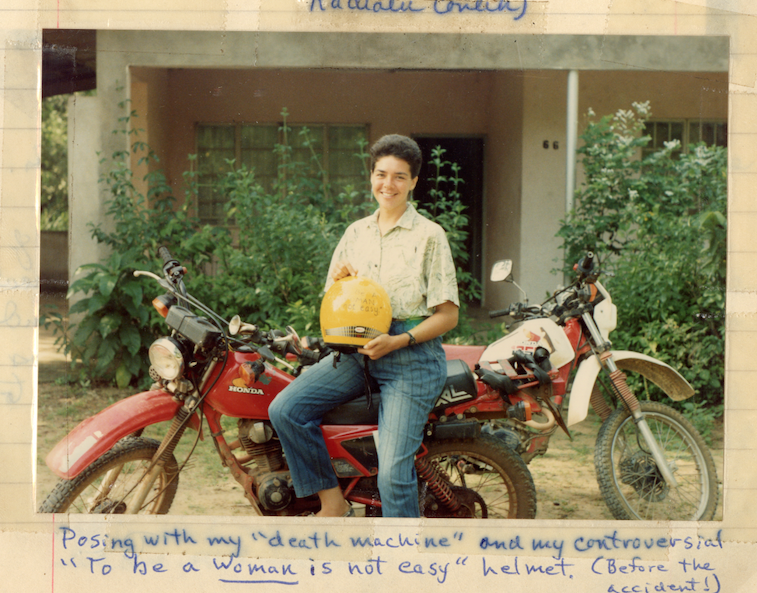
A young woman perched on the seat of a motorbike, with the caption, “Posing with my ‘death machine’ and my controversial ‘to be a woman is not easy’ helmet. (Before the accident.)”
Thankfully, Bernadette Chaloupka only injured her ankle after an accident on her motorbike; however, the Peace Corps still flew her back to Washington, D.C. to recover—cutting short her time in Sierra Leone. She writes about travelling back to the U.S. afer a local doctor called for surgery:
“I’m a living example of why the Peace Corps has decided to ban motorcycles…Even though an operation was unnecessary, I tell Peace Corps plenti plenti tenki for that wonderful holiday!”
Chaloupka’s experience with motorcycles is just one of many. As I dug through Peace Corps policies, volunteer memoirs and letters home, I found that Chaloupka’s brief recovery period was a minor consequence compared with the many stories of motorcycle accidents.
Between 1961 and 2003, the Peace Corps reported that 89 volunteers died in motor vehicle accidents—21 of them involved a motorcycle. An article in the 1985 Peace Corps Times advised volunteers on motorcycle safety, reporting that in 1983, fourteen volunteers were evacuated to the United States due to motorcycle injuries.
That said, reliable transportation is an important piece of volunteer service, when distances between villages and cities could be several hundred miles away. For some, motorbikes were a beneficial way to get around during their assignments, connecting volunteers to important resources in other regions.
Alan Crew, a PCV in Nigeria 1965- 1966, mentions that as the only form of transportation available to him, his motorbike was important for travelling the long distances from his village to meet other volunteers or go into bigger cities. He wrote to his family in 1965,
My motorcycle is running beautifully, although it still isn’t completely broken in. I can understand the almost reverent feeling the old volunteers have for their machines, as they afford one the only means of mobility available…There are 104 of us within 125 miles of each other so that we can all get together on weekends if we like. Therefore, the mobility of the motorcycle takes on a new dimension of importance.
In the case of Jane Wertz, her motorcycle may have been the only thing that helped her safely leave Zaire during military-led riots in 1991. Wertz was featured in a Peace Corps News article following the event, relaying her journey from her host village to Kikwit, the closest city with a Peace Corps office. “Usually it’s about a 3 ½ hour trip, but it took me about six hours because I had too much stuff on my bike…It was dark. I had fallen about six times. The bike was really, really heavy. There were times when I thought I wouldn’t be able to pick it up.” Wertz’s motorcycle, as heavy as it was, was the only thing that could have gotten her to the office for evacuation.
Today, the Peace Corps allows volunteers to use motorbikes only on a project-by-project basis. Many of these exceptions are for volunteers in rural areas, only after comprehensive safety training. And, at the heart of the manual? Wear your helmet!
Sources:
Office of the Chief of Staff, “MS 523 Motorcycles and Bicycles” January 7, 2013. https://files.peacecorps.gov/documents/MS-523-Policy.pdf
Adventure in a Great Big World,” by Alan Crew, Peace Corps Community Archives, https://blogs.library.american.edu/pcca/adventure-in-a-great-big-world/
Angene Wilson and Jack Wilson, Voices from the Peace Corps: Fifty Years of Kentucky Volunteers (University Press of Kentucky, 2011).
Susan Trebbe and James C. Flanigan, “Exit from Zaire,” Peace Corps Times, Fall 1991. https://dra.american.edu/islandora/object/peacecorps%3A2500?solr_nav%5Bid%5D=680d78e377b816da1f3b&solr_nav%5Bpage%5D=0&solr_nav%5Boffset%5D=8
Pat Seaman, “Peace Corps and the Art of Motorcycle Safety,” Peace Corps Times, January-February 1985, 8-9. https://dra.american.edu/islandora/object/peacecorps%3A2463/datastream/PDF/view

In 1983, Jim and Carolyn Hitter left a notebook in the Peace Corps Rest House in Kambia, Sierra Leone, as a way to remember the work of their fellow volunteers. Scrawled on the inside cover of the faded notebook: “Dedicated to us, the PCV’s, VSO’s of Kambia. Twenty years of Volunteers have been here and left no record, no footprints…With this small beginning maybe our successors will know us by our deeds and misdeeds.”
Once the first journal filled, other PCVs added another in 1988. Many of the entries are a bit of gossip, others are firsthand reflections and memories of their time in Sierra Leone.
Here are some entries from the two notebooks:
Dewey- N. Carolina
Econ major at UNC? Aggie [Agriculture] at Bapinga 1980-1982. Extended to fisheries winter of ’82. Lived with Pa Laurin. Seemed to get along well with farmers. Speak languages well. Mr. Generosity. Dewey gives things away!
Extremely conservative politically.
Married Sierra Leonean, Regina Durwig, at Pt. Loko on 9 July 1983.
No; Dewey’s father came to S.L. to convince him that this was not a wise thing so Dewey’s wedding apparently turned into an “engagement party.”
In fact, Dewey went home without Regina and apparently with an agreement that he would never come back, nor send for her.
Page from Jim Hitter’s Notebook, Jim Hitter Collection, Peace Corps Community Archives.
Logan 72-74
History at Kolenten. Had a masters in World History and a BA in African History. (Orland was in his Form III Class). There was a riot at school because all the history students were getting poor grades. “Logan must go or die” was chalked on the streets. According to Orlando, “he resembled Jesus and he never laughed.
Jim Hitter, 1982-1984 Kambia
…”Lived” (in a matter of speaking) through 2-3 extensive beer droughts. Saw the price of STAR [beer] go from $.80 to $4.00.…Never taught before this experience and never will again. In fact I expect never to work again. My background for this was some years as an engineer in the aerospace industry, VISTA (in a veterans project in Seattle) and 10 years retirement. I would have been long gone if it hadn’t been for the support/love/and good humor of Carolyn, my wife!
Martin Seviour,
1980-1982, Sewafe/Kono
1982-1984, KambiaI’m leaving this country tomorrow after 4 years, and it does seem a day too long! I’m a VSO. I taught secondary English in Sewafe for two years and came to Kambia to work in the KELT Primary English Project.
I dislike Kambia only slightly less than Jim Hitter and know only slightly more Temne…I would like to deny all rumours that I extended only to avoid the draft for the Falklands War.
Hopefully, I will be the first of a long line of VSO’s using the Kambia Rest House. I would like to express my thanks to all the PCVs who have strived at all time to let me not feel inferior. Special thanks should go to Douglas whom I’ve only known for a short time but who has been a good friend (Keep the toilet clean Dough!) and to the Hitters who have put up with my verbal ramblings late into the might and have cooked wonderful meals and given me lots of encouragement and advice…”
Carolyn Hitter
1982-1984, Kambia, Primary Workshops…The Hitters lived in the “suburbs” –on the fringe of Kambia at Kolenten. The greatest thing thaat happened in Kambia was finding Kemokoh, an excellent cook, an honest man, and the only Sierra Leonean to complete a job on time…
Jim and Carolyn, old enough to be the parents of other Kambia volunteers (47 and 45) showed their age by drinking more beer than most. All those years of practice, you know!
Jim and Carolyn Hitter, 1982. Jim Hitter Collection, Peace Corps Community Archives.
[Added by another volunteer:] “Pictured above in typical form. Great people who are well worth visiting should anyone pass through Seattle.”
And in the second journal…
Bernadette
“I succeeded Chris Lavin in Bayonde village. I have enjoyed living with the Jimbra people, and tell God “tenki” everyday that I was not placed in Temne-land; Bayonde is a “seke-free zone.”…Unlike the other Kambia PCV’s and VSO’s, I was not particularly fond of Kambia, mostly because of the rude, obnoxious, ruff bobos that hung around the rest house, whose hobby was to taunt me…
Anyway, back to Bayonde and my Peace Corps “work.” I think all of us PCV’s have realized that we are not here for the work we do; we are here as cheap P.R. for the American government. I guess that’s not so bad as long as we realize that, and also realize that we are not going to “develop” this country. As I’m sure you’ve heard a zillion PCV’s say: It’s not the work that counts so much, it’s enjoying the people and the culture where you will get the most satisfaction. At least, this has been true in my case…
I am a living example of why the Peace Corps has decided to bag the motorcycles. I broke my ankle in a Honda spill and was unnecessarily sent back to D.C. (a Salone doctor wanted to operate–yikes!) Even though an operation was unnecessary, I tell Peace Corps plenti plenti tenki for that wonderful holiday!”
Bernadette on her motorcycle in Sierra Leone. Featured in her entry in the second notebook. Jim Hitter Collection, Peace Corps Community Archives.
After the program in Sierra Leone disbanded in the ‘90s, the journals made their way to the United States. In his own notes about the journals, Jim explains: “In 1994, when rebel activity became too much, the Peace Corps was ordered out of the country. The diaries (and the large US flag that hung on the Resthouse wall) were rescued by the Catholic fathers and sent to the US.”
Another RPCV preserved the journals until 2002, when they were ceremoniously revealed at the Friends of Sierra Leone annual meeting and 40th Peace Corps Anniversary Celebration in Washington, D.C.
Every volunteer watches as the world at home continues while they are abroad. Some changes are personal, such as the birth of a nephew or the death of a loved one. Other events are huge—where the entire country laments at the news of a disaster.
Thousands of miles away, Peace Corps Volunteers received news that shook the nation, and even the world. Radios broadcast the assassination of President John F. Kennedy and his brother Senator Robert Kennedy, the destruction of the 1992 Los Angeles riots, and the deadly attacks on September 11, 2001. While distance can lend space to heal from tragedy, it also cuts PCVs off from important support systems.
These six volunteers watched American events unfold from the non-military, external broadcasting program Voice of America, newspapers, and letters from their families and friends. They reflected on national elections, assassinations, and devastating disasters—often remarking on their isolation and questioning their faith in humanity.
“I don’t see much in the future.” Assassination of John F. Kennedy- November 22, 1963
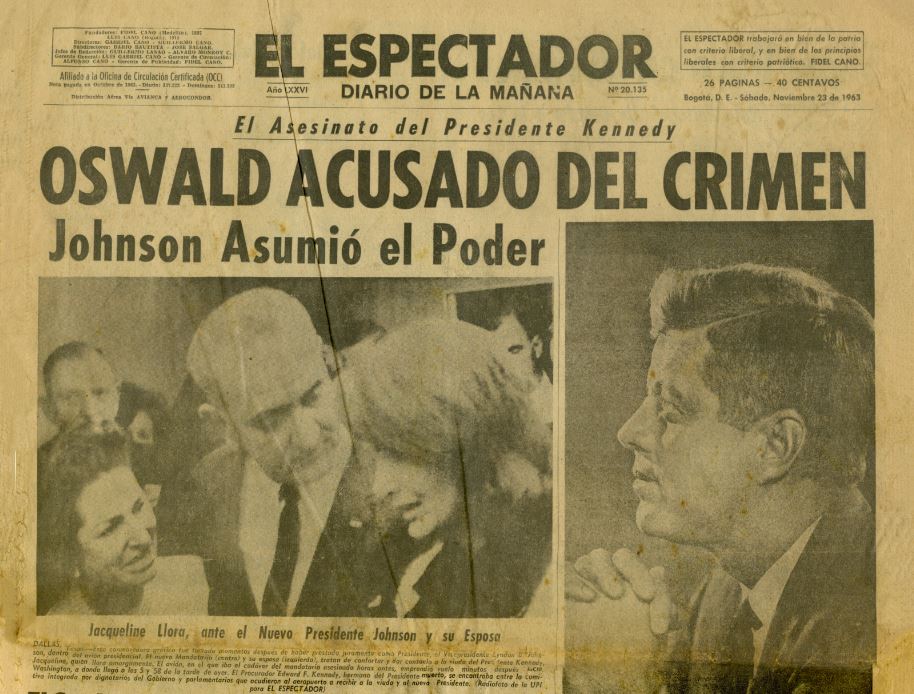
Headline in Colombian Newspaper on November 23, 1963. Friends of Colombia Collection, Peace Corps Community Archives.
Geer Wilcox learned about the assassination of John F. Kennedy’s while living in the Dominican Republic. As a blind Peace Corps Volunteer, Wilcox relied on hearing the news from neighbors reading newspapers and the radio. He often commented on the state of American politics or the Vietnam War as he listened to the international news broadcast, the Voice of America. When the news of Kennedy’s death broke, Wilcox reported feeling apprehensive of Lyndon Johnson and the future.
Wilcox expresses his shock in a recorded letter home to his parents on November 30, 1963:
Rene Cardenas was in Colombia when the news broke. She processes the aftermath of Kennedy’s death in a poem titled “Yesterday November.”
The address for sorrow
two inches away
the president has been killed
the clouds of wet season
the earth’s longest pity
everything is split time
a piece of wood
pulled apart at the grain
in an apartment in Cucuta
han asesinado a Kennedy
bells toll for three days
sent notes of condolences
to the wall
by my bed
two inches away
from my face.
Additional reactions to President Kennedy’s death are recorded here.
“What a sick society I left.” Assassination of Senator Robert Kennedy- June 6, 1968
Even as he served in Western Samoa, Arthur Aaronson wrote home often about the 1968 Democratic candidates Senator Robert Kennedy and Eugene McCarthy. He heard about the attack on Senator Kennedy from other PCVs and the radio, which gave details about what happened in the hotel kitchen of the Ambassador Hotel. Aaronson wrote to his parents that evening:
I heard the news about Kennedy Wed. night as I was walking back from a dance with my sister. Two volunteers walked by and they told me the news. I was stunned. Then when I heard it on the radio that night I could only cry as the radio gave the details. The death of Martin Luther King didn’t hit as hard. Probably because Kennedy was on the way to being the next President. All the wealth and power of the U.S., it does not hide the fact of what a sick society I left.
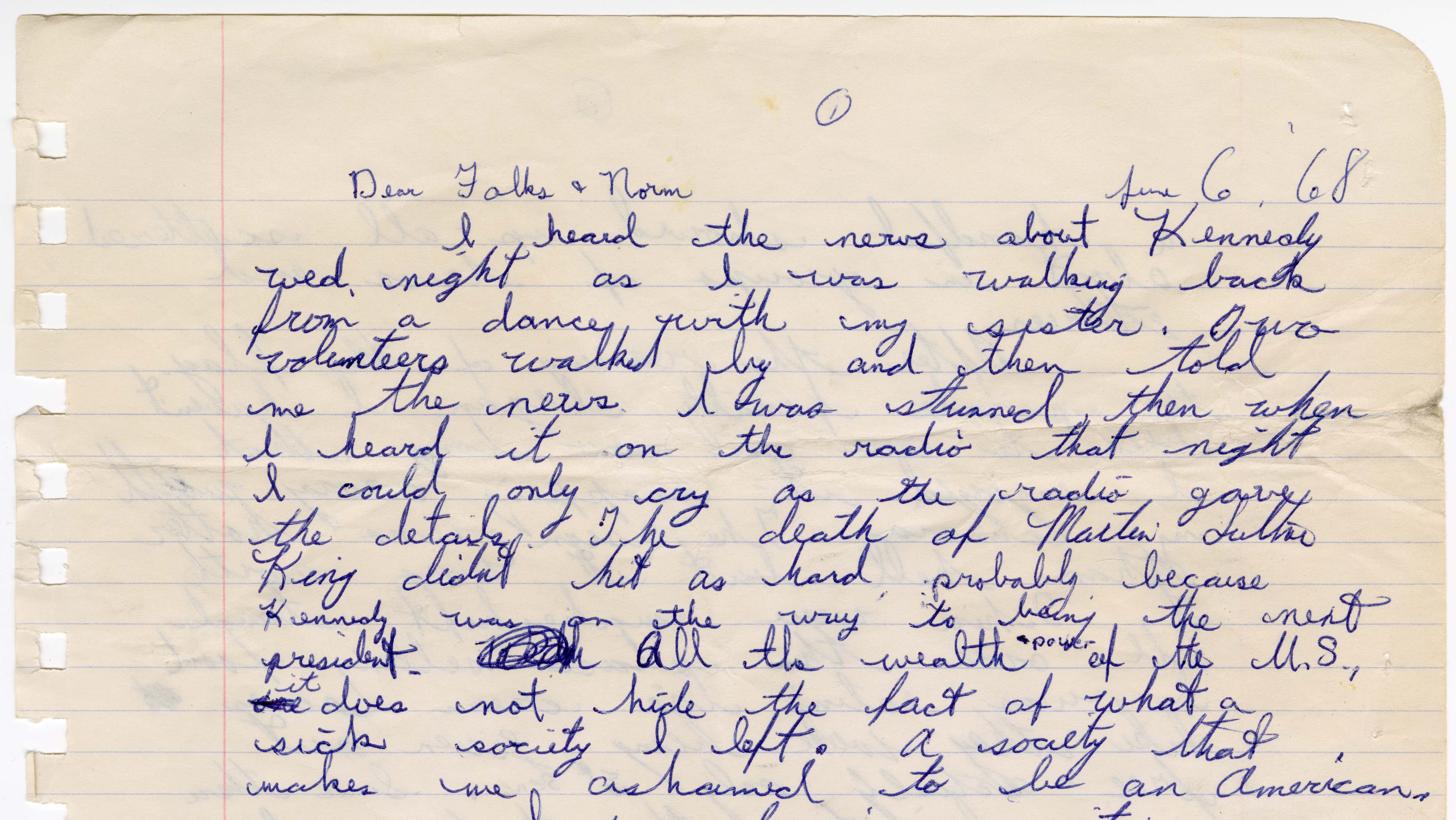
Aaronson’s letter home on June 6, 1968. Peace Corps Community Archives.
“I can only hope something good comes of all this.” Rodney King Riots- April 29, 1992

Photograph submitted by Dark Sevier on January 1, 2008. Flickr Creative Commons
In March 1991, a bystander recorded a video of four L.A. police officers beating Rodney King—a black motorist—for a reported 15 minutes as other LAPD officers looked on. Despite the video evidence, the court found the four officers “not guilty” of excessive use of force on April 29, 1992. Fueled by this acquittal and years of racial and economic inequality, riots broke out around South Los Angeles, raging for 5 days.[1]
Tina Singleton watched the riots transpire as she completed her volunteer staging in Cameroon. She had lived and worked in San Francisco for 10 years before joining the Peace Corps in 1992. Singleton followed the events and devoted several diary entries to her thoughts:
30 Avril 1992
Just heard about the 4 police officers in the Rodney King Case being acquitted—I was sad and in shock. I just don’t understand how the jury came to that conclusion—it blows me away—I’m so upset. It’s hard to concentrate on anything. I’ve had a few good cries. Also heard about the rioting in L.A.—it’s awful—but I understand the reaction. This was such a blatant disregard for justice and Rodney King’s civil rights—what a disgrace—and with all the evidence—a videotape and all the tapes of the officers’ conversations—and they still got off. Rose-Marie and Soyeon and I were/are very shaken by this. The U.S. is getting worse by the minute. It makes me not want to even go back to the U.S.—I’m happy I’m here for two yrs.
1 Mai 1992
It’s gotten worse—protesters are now in San Francisco, Atlanta, Dallas—they’ve blocked the Bay Bridge again. Can’t believe all this is happening—1992 and we’re having race riots. I can only hope something good comes of all this—the rioting, the looting—I almost wish I could pick up a phone and call Jean and Peggy. This was my first taste of what it’s going to be like when a serious situation arises in the U.S.—I felt pretty cut off. I see what volunteers mean when they say the shortwave will become your best friend. We listened to is as much as possible. What I wouldn’t do for a newspaper right now. This is the weekend we stay with a Cameroonian family—should be interesting. Though I’ve been upset and crying today about this Rodney King episode. I just can’t believe this has happened—It still blows my mind.
Lundi, 3 Mai 1992
Heard on the news this morning about L.A.—2,000 people hurt, 40 dead, Bush has declared L.A. a disaster area. I guess he’s going to LA this week to see the damage—don’t have figures on the other sites—saw the news this weekend on TV at my family. L.A. looks pretty bad—fires everywhere. Saw Rodney King—he was so upset. I felt so bad for him. He kept saying “it’s not right, this isn’t right—we only want our day in court.” He was pretty devastated about all the violence as well—he spoke about the people not being able to go home to their families. He looked so devastated—I felt so bad for him. He just looked so bad—so down. Like I said before—I hope something good comes of this.
5 May 1992
Well, last nite was a real shit nite. Sebastian brought newspapers from Dovala—A USA Today and some French language papers. I was not ready for what I saw—the pictures really floored me. I knew it was bad in LA, but I didn’t know how bad. The man [Reginald Denny] being dragged from his truck and shot—then robbed. The white man who was on the ground and being kicked by 3 Black men—it’s so sick. I’ve got such a bad headache. I can’t stop thinking about all this madness. This whole thing has me wondering why I’m here and not at home doing something to help the situation there.
It’s so hard to concentrate on my French—we’re here for only 2 more weeks. I am worried about my French—it doesn’t seem so important anymore. I hope I’m not going to feel like this for a long time—I know if I do, I’d leave, and I don’t think that’s what I want. I’m just so confused now. People here seem to think things will be better after this, but I don’t think so. I’m feeling pretty pessimistic at this point—I’ve no other reason to feel otherwise. Soyeon and I had a good cry last nite. We’re both in a daze, as is Rose-Marie. Heard on the news this A.M. that 10,000 businesses were lost as well as at least that many jobs—which is something we can’t afford to lose.
Soyeon and I are calling home tomorrow—I can’t wait. I really need to talk to the folks—I might call Jean too. I’m not sure—it will be great to at least talk to Mom and Dad. It’s sounds like Mom’s feeling a little lost with me gone. It’s weird for me not to be able to pick up the phone. I was dying to talk to them last night—tomorrow will come soon enough.
— T
As a Black woman who lived in California—or rather, anywhere in the United States—Singleton was shocked and devastated by reoccurring injustices in the United States. Cut off from her friends and family and relying only on news from the radio and infrequent newspapers, she found support from two other Black volunteers—Soyeon and Rose-Marie—to process the injustice of the trial and the impact of the riots.
Despite her initial desire to return home, Singleton spent 3 years in Benin, West Africa as a Health Educator. She became an international development worker for over 20 years and launched a program called Transformation Table, devoted to promote sharing a meal and culture between communities, in November 2016 in Charleston, SC.
“We shortly came to the realization that life had changed.” September 11, 2001
Living in a remote village in Zambia, Lara Weber was listening the the Voices of America when the voice over the radio reported, “”A… plane… has… hit… the… World… Trade… Center… in… New… York… City…” With no electricity, internet, or phone within a day’s drive, Weber explained feeling detached as more and more reports rolled in. She also worried about her father, who occasionally visited the Pentagon on business.
The weeks that followed were strange in that I had no Americans to talk with at all. Some of the elder men of the village visited me one day. They wanted to understand the news better, and their questions were interesting. One man wanted to know more about the Twin Towers and Manhattan. Why did so many people need to live and work on top of one another in such vertical spaces — had we run out of land in the rest of America? I tried to answer, but what I said felt inadequate and the whole idea of New York suddenly made no sense. Why did we pile into cities like that?
Rhett Power’s experience was a little different. As a volunteer in Uzbekistan, Power remembers a sense of confusion and urgency following the events, as the Peace Corps determined when to evacuate PCVs in the countries close to Afghanistan.
Power remembers sitting on the floor of a hotel room in the capital with his wife and a group of PCVs after a series of new volunteer training sessions. They were watching CNN when it happened. Power recalls the initial reaction:
I remember it distinctly. My wife and I were…Well, we were in the capital. So we were actually getting ready to go to the airport. I think a group had either come the night before or the day of. We were at a hotel. We were doing a Peace Corps training for new volunteers. There was another married couple there, they were education volunteers—I think he was a health volunteer—but anyway, we were together in the hotel. We were actually loving life because we were in a bed. A really good bed and we actually had two boxes of pizza on the floor. I think we had Orange Fanta and we were beside ourselves. The luxury of it all.
I distinctly remember this—we had a tiny little TV on CNN. You know, again we were watching TV. We didn’t have anything else to watch. But we had one international channel. And, that’s when it happened. And, we were watching it and just—we were just as shocked as everybody else was. I think [we] shortly came to the realization that life had changed. Because we all knew what would happen. Very shortly thereafter—within that hour we knew that something had changed and that something would change.
After three weeks, the Peace Corps evacuated Power and the other PCVs living in the Middle East and sent them back to the United States without reassignment.
As people back home find support within their communities, during times of tragedy PCVs find themselves relying on other Americans, throwing themselves into their work, or talking with their host communities about the implications of the event. Often, these tragedies lead to a renewed sense of faith in the mission of the Peace Corps—as seen in the uptick of Peace Corps applications in the wake of the Kennedy assassinations and 9/11. In other cases, such as the riots in L.A., it can be a reminder of how far we haven’t come.
When President Kennedy signed the Executive Order to establish the Peace Corps in 1961, he sought to “encourage mutual understanding between Americans and people of other nations and cultures.” Kennedy’s words echoed in the ears of those who lived during a decade of social tension and Cold War anxieties. Since the 1960s, the Peace Corps has trained and placed more than 235,000 volunteers, all joining for their own personal reasons: for peace, to improve the lives of others, and to learn new cultures. Several volunteers: Carolyn Gullat, Clinton Etheridge, Yancy Garrido, Shawnette Brandt, and Amina Johari, shared their desire to benefit the countries of their ancestors and reconnect with their heritage.
Carolyn Gullat is a Black Peace Corps Volunteer from Washington, D.C. She served as a teacher in South India from 1966-1968. Gullatt describes her choice to join the Peace Corps in an interview from Jonathon Zimmerman’s “Beyond Double Consciousness: Black Peace Corps Volunteers in Africa, 1961-1971,” featured in the December 1995 issue of the Journal of American History:
“For most of her own college career, Gullatt recalled, she had dismissed the Peace Corps as ‘for whites only.’ Then she met a Black recruiter, who ‘didn’t run down the usual jive propaganda about how nice it is to help people.’ Instead, ‘he talked about how I, as a Black person, could get ‘home’ and join with the Brothers and Sisters’ abroad, where ‘people have grown into Black pride naturally, where Black power is the status quo, and Black action is a working reality.’
“’Each year the Peace Corps sends hundreds of white ‘do-gooders’ to ‘help’ Black and Brown people throughout the world,’ Gullatt complained. ‘Black Americans owe it to themselves and to the Brothers and Sisters in developing countries to get up and get involved.’ – Page 1000, interview with Carolyn Gullatt by Donald M. Feeney, c.1971.
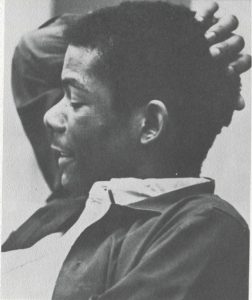
Clinton Etheridge joined the Peace Corps in 1970 and became the first African-American PCV to serve in Gambia, West Africa. Read more about Etheridge’s experience in an interview with Peace Corps Worldwide.
“I was a secondary school math teacher in Peace Corps Gambia from 1970-1972. I grew up in Harlem, came of age during the Civil Rights Movement, and was a black student leader at Swarthmore College in the late 1960s. Like many young blacks of that generation, I wore an afro and dashiki and was ‘black and proud’ and fascinated with Africa. I joined Peace Corps Gambia seeking my own answer to the question ‘What is Africa to me?’ posed by Harlem Renaissance poet Countee Cullen in his 1925 Heritage.
“I started out asking the question, ‘What is Africa to me?’…Then I asked the question, ‘What am I to Africa?’ when that Latrikunda schoolboy told me he didn’t have the math book to do the homework with because his father was ‘a poor Gambian farmer.’ Then, as a Stanford SEED business coach, I came to the conclusion that, moving forward; an important question will be ‘What is Africa to the world?’” “What is Africa to Me?” National Peace Corps Association, June 4, 2018.
Yancy Garrido was born to Cuban parents who immigrated to the United States during the Cuban Revolution. Between January 1987 and August 1990, Garrido served as a Peace Corps Volunteer in Honduras within a community mental health program. In his interview with the Oral History Project at the John F. Kennedy Presidential Library, Garrido explains his personal desire to serve in Latin America.
“I’m the son of Cuban refugees. My parents left Cuba because of the Cuban Revolution. Actually, would probably have never met if it had not been for the United States because my mother was the daughter of Batista’s diplomatic photographer—no one of high importance in the government, but still in the government—and my father cut sugar cane on a farm…But they met in New Jersey. And so, always in my mind was just being thankful for living in the United States. For having opportunities that I never would have had. So it was always in my mind, “How could I give back?”—not necessarily Peace Corps at the time, but to Latin America and represent my country…
“When the Peace Corps Volunteer came, the way they spoke about the experience was exactly what I wanted…The way it was pitched, I never thought Peace Corps was going to appeal to me…Once I spoke with the volunteer—they went “No, no, no—don’t get stuck with the messaging. You’re really going and working another country and you are trying to see if you can add value. And, if all goes well when you leave you’ll have helped establish something and people will continue that project without you.” The idea was to help get things started, not to actually take the place of someone. Because the last thing I wanted to do is take someone’s job.”
“So I applied, and of course my professors did not want me to go. They were grooming me to go get my doctorate and go be a professor of Spanish literature. My parents did not want me to go because they said “We left Latin America for you. Why are you going back?” But I went, and it’s the best decision I ever made in my life.”
Shawnette Brandt served in St. Lucia, Eastern Caribbean from 2013-2015. She speaks about her experience in the Peace Corps Stories blog on February 9, 2015:
“I was born in the United States and I am Guyanese. Although I had never been to Guyana, which was quite embarrassing to say especially around fellow Guyanese, I have always had a strong desire to visit the land of my parents… Even though I was cognizant of my dual American and West Indian heritage and the impact it could have on my work, I didn’t immediately understand the dichotomy of my culture was an asset and, in some cases, became quite a challenge.
“For the first time in my life, I lived in a country where the vast majority of the people looked like me, shared similar foods, music and a West Indian identity. It never occurred to me that I would face xenophobia. I tried to use this as an opportunity to gently challenge their prejudices either by comments and or deeds. I may not have changed minds but perhaps planted seeds for their further growth…Hearing the voices, the English Creole widely spoken all around me, felt more like coming home. And in a sense it was. I now have two countries that are my home.”
Amina Johari’s mother met her father while serving as a Peace Corps Volunteer in Kenya during the 1990s. Johari is currently teaching secondary school in Tanzania. In her 2019 article on the Peace Corps’ Stories blog, she reflects on her desire to understand more of her father’s culture:
“Serving as a Peace Corps Volunteer in East Africa was an opportunity to spend an extended period of time and have a positive impact in a part of the world I consider to be my second home. While I was born in Kenya and spent the first few years of my life there, a part of me always felt that in order to really understand my father’s roots and where I come from, I had to spend more time there than the short trips to Kenya my father took my sister and I on every other year…
While I do think about mom a lot, I think the person I feel like I am really getting closer to is my father. Growing up I sometimes felt confused by my father’s habits, prioritization, and world view. But all that seems to be changing. Every hour I spend working with the kids in the classroom, every tea break I spend in the staff room with my fellow teachers, and every conversation I have with my neighbors in my father’s native tongue, I can feel myself getting a better sense of the boy he was, the man he became, and the person he wanted to be. – Amina Johari, “Why the Peace Corps? Reconnecting with my East African Heritage,” PeaceCorps.gov Stories, July 17, 2019.
Sometimes serving in the Peace Corps offers you the opportunity to follow the legacy of your parents, expand your understanding of ancestral culture, or give back to the country you’ve heard about so many times. No matter the reason, every Peace Corps Volunteer brings countless identities with them during their service. So, how does your identity impact your decision to go abroad and your relationships with those you meet along the way?
Find out more by visiting the National Peace Corps Association website, John F. Kennedy Presidential Library’s RCPV Oral History Project, and us—the Peace Corps Community Archive.
John P. Hughes
Country of Service: Nepal
Dates in Service: 1970-2010
Accession Date: 29 October 2018; 22 September 2022
Access: Unrestricted
Collection Size: 3 items
Document Types
Digital Surrogates
Related Items in Other Repositories
Finding Aid
Once a volunteer’s service has ended, they have to decide what to do after the Peace Corps. Some volunteers extend their service, some go on to graduate school, and some simply come home to the states and resettle into daily life.
The following are stories of what some volunteers did after their service.
When Alanna Randall was preparing to leave Belize in 2003 she was deciding between graduate school and joining Americorps, a Peace Corps-type program in the U.S. To help with her decision, Alanna used a chart that her local PCV magazine published.
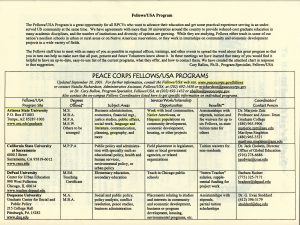
Alanna Randall, Belize, 2001-2003. This chart is from the PC Belize Magazine “Toucan Times” Oct/Nov/Dec 2001
She eventually decided to join Americorps and served in Tuscon, Arizona as a Team Leader for Youth Volunteers. She then went on to pursue a Masters Degree in Teaching Spanish at the School for International Training in Vermont.
Tina Singleton started her service in Benin in 1992 and extended it two years to 1996. Even though her family encouraged her to serve another year, Tina decided she was ready to leave. However, she was debating between finding a job, taking courses in Community Based Rehabilitation, or applying to graduate schools. She eventually decided on graduate school in London.
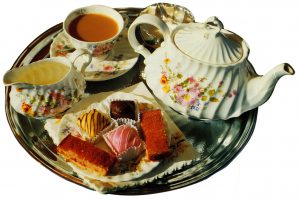
Tina Singleton, Benin, 1992-1996. This postcard was sent to her parents from England while she was preparing to start graduate school.
Tina sent this postcard to her parents in March of 1997 and told them: “I managed to get through exams …!! I’m pretty sure I passed . . . now i can sit back (for a few minutes, anyway) and drink tea . . .”
Once Lynda Smith-Nehr completed her service in the Philippines in 1964 she traveled the world before heading home. Lynda visited Japan, India, Egypt, Palestine, Italy, Switzerland, England, DC, and New York.
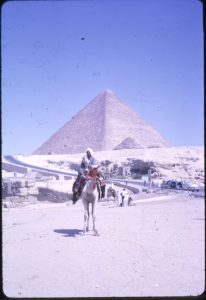
Lynda Smith-Nehr,Philippines, 1962-1964. This was taken on her travels to Egypt after her service ended.
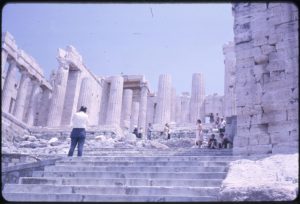
Lynda Smith-Nehr, Philippines, 1962-1964. This was taken on her travels to Greece after her service ended.
As evident from these examples, volunteers have a lot of paths to choose from when their service is over. And their two years in the Peace Corps gives them a lot of experiences to build their new lives with.
Country of Service: Central African Republic/Benin
Service Type: Health Education
Dates in Service: 1992-1996
Keywords: Health
Accession Date: December 14, 2017
Access: No restrictions
Collection Size: 2.0 linear foot
Document Types:
Finding Aid